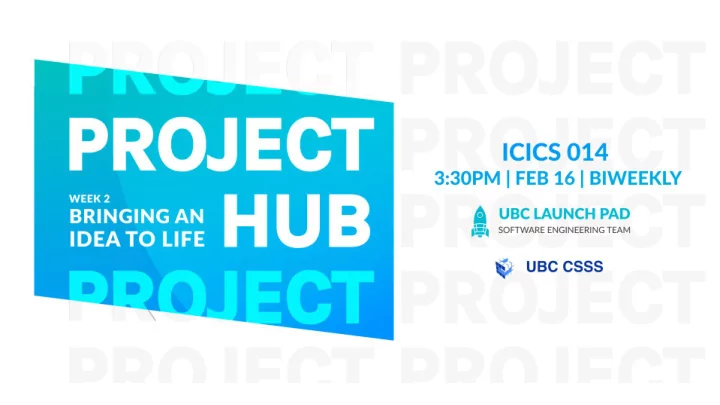

Biweekly (hopefully) ● Workshop or talk ○ PROJECT HUB Demos! ○ Open workspace ○ Food! ● Make friends! ● Learn stuff! ●
PROJECT HUB Slack Workspace: https://ubccsss.org/projecthub-chat
BRINGING AN IDEA TO LIFE
Robert Lin @bobheadxi ● BSc Mathematics 3rd year ● Launch Pad Tech Lead Web + Moonshot ● Interested in backends, DevOps, and ● distributed systems
1. Why build “personal projects”? TODAY’S 2. Ideation KEY POINTS 3. Putting things together 4. Long-term considerations
“YOU SHOULD MAKE PERSONAL PROJECTS!” ...but why?
k e e w a e d o c t e e l f o s r u o h 0 4
1. WHY?
Beautiful GitHub profile Things to spice up your resume PERKS “I’ve written some Python” “I can object oriented blah blah”
What is software engineering? The code you write matters CONSIDER... A lot of cool stuff to learn Problem solving comes with practice
CONVINCE YOURSELF convince yourself of your goals
2. IDEATION
What am I interested in? QUESTIONS What sounds cool?* TO ASK What sounds fun?
What programming language am I going to use? DON’T ASK Omg it sounds hard can I actually do it? Will it make me money?
Simple is good Simple is probably harder than you think KEEP IN MIND Hard is probably easier than you think* It doesn’t have to be super unique at first What are your goals?
Subreddit app Useful tools recommendation browser? Annoying things Finding good apps Friends arguing Spotify + song requests? over what to play next on Spotify
Websites aren’t always the best first project BOB’S You don’t have to do it yourself THOUGHTS It doesn’t have to be your project to start with* Define your features - a “MVP”
Minimum Viable “Product”* A set of core features / pieces of functionality “MVP” Could just be one thing Less is more It doesn’t have to be fantastic
Friends arguing Spotify + song requests? over what to play next on Spotify Log in ● Create a playlist ● Let users request songs for a ● particular playlist Allow creator to approve songs ●
3. PUTTING THINGS TOGETHER
Look at each of your features and think about how they might work BREAK IT Consider your interface DOWN web/mobile app? ● command line? ● messenger? ●
Learn about the pieces you’ll need web/mobile app: how will it interact ● with things? RESEARCH Look at examples! similar projects on GitHub ● how does Spotify work? ●
Some magic thing on the Spotify App internet that returns songs
Some magic thing on the Spotify App internet that returns songs My App??
Be patient BOB’S You won’t know everything THOUGHTS Don’t be afraid of reading source code Aim for a high-level understanding - try to visualize the pieces of an example
Make use of on-hover tooltips and the ability to jump into the source for a function (cmd-click or something) Browser: Sourcegraph extension ● Code Editor: Visual Studio Code, IntelliJ, etc. ●
Don’t be too opinionated about tech BOB’S Don’t worry about people saying “oh THOUGHTS Python/MongoDB/x is slow” The goal is to put something together
Node.js HTTP requests Spotify Bot Server API HTTP requests Messenger API
Node.js
4. LONG-TERM CONSIDERATIONS
Instructions for the computer, and you! WHAT IS You want to be able to add new features without destroying everything CODE? You want other people to be able to look at it (maybe)
Add new feature Run old tests Keep hacking! Debug specific failing tests and behaviours
Set up a clear, automated procedure DEPLOYING https://github.com/ubclaunchpad/inertia (or some scripts, Heroku, etc….)
Programming means getting a program working. You have a problem to solve, you write some Go code, you run it, you get your answer, you’re done. That’s programming, and that's difficult enough by itself. But what if that code has to keep working, day after day? What if five other programmers need to work on the code too? Then you start to think about version control systems, to track how the code changes over time and to coordinate with the other programmers. You add unit tests, to make sure bugs you fix are not reintroduced over time, not by you six months from now, and not by that new team member who’s unfamiliar with the code. You think about modularity and design patterns, to divide the program into parts that team members can work on mostly independently. You use tools to help you find bugs earlier. You look for ways to make programs as clear as possible, so that bugs are less likely. You make sure that small changes can be tested quickly, even in large programs. You're doing all of this because your programming has turned into software engineering . - Russ Cox
EXTRA
THANKS!
Recommend
More recommend